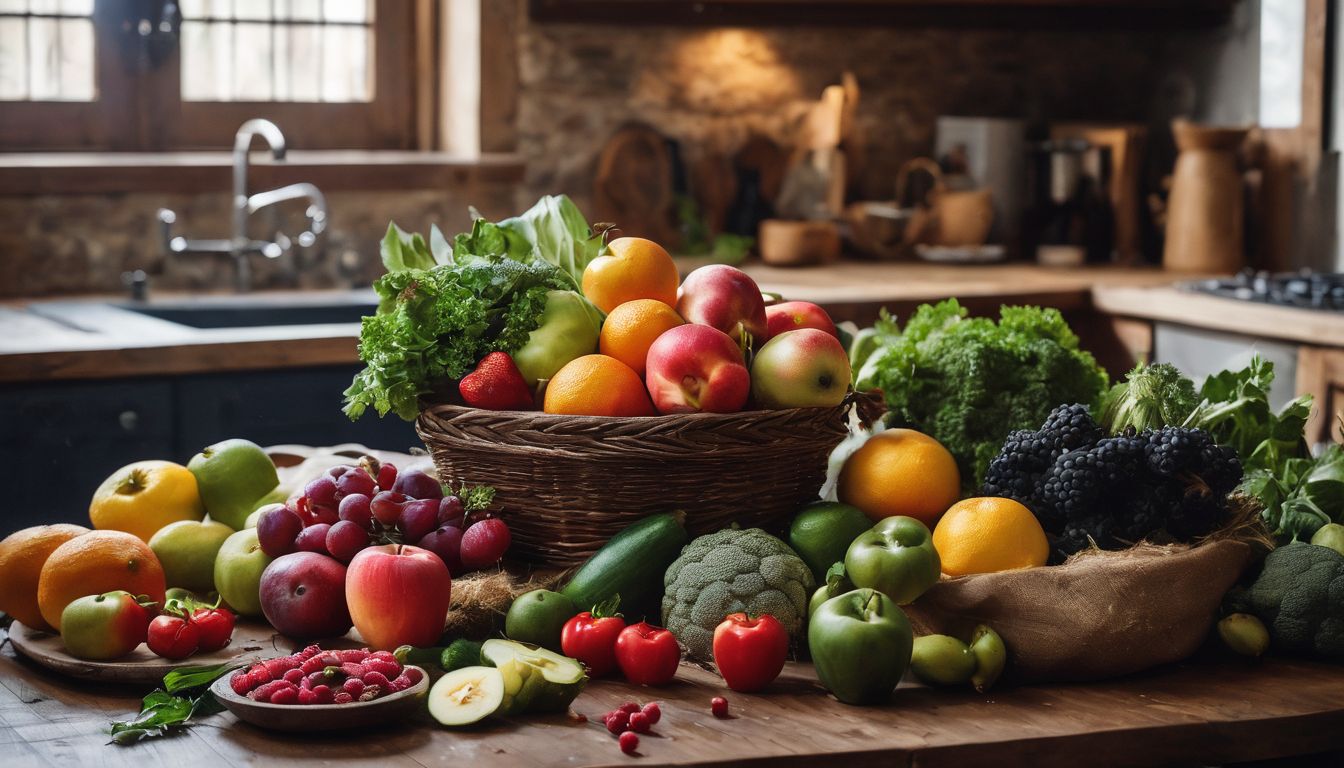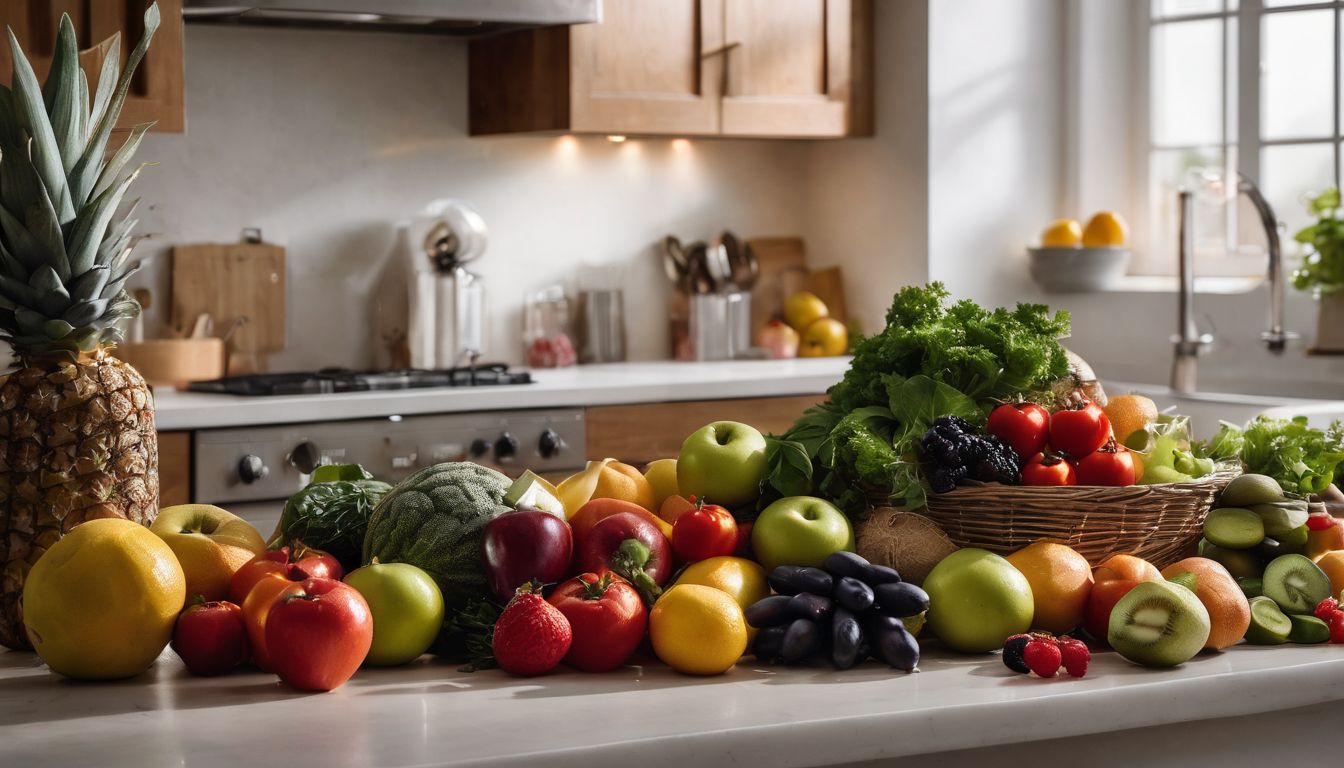Struggling to balance your vegetarian diet? It’s a common concern, especially when ditching meat for the first time. Our guide is packed with practical tips to ensure you’re getting all the nutrients you need.
Dive in and discover how easy a healthy veggie life can be!
Key Takeaways
- Incorporate a diverse range of plant – based proteins like lentils, chickpeas, tofu, and nuts into your vegetarian diet to ensure you’re getting enough essential nutrients.
- Focus on eating whole foods such as fruits, vegetables, grains, and seeds while limiting processed foods to support both health and environmental sustainability.
- Consider taking supplements for nutrients that may be lacking in a vegetarian diet such as vitamin B12, iron, and omega-3 fatty acids.
- Embrace variety by trying new recipes from different cultures and experimenting with a wide array of fruits and vegetables for balanced nutrition.
- Connect with fellow vegetarians through communities or cooking classes to share tips, find inspiration for meals, and get support on your journey towards a sustainable lifestyle.
The Basics of a Vegetarian Diet
Focus on getting enough nutrients like protein, iron, calcium, and vitamin B12 from plant-based sources. Avoid processed foods and aim for a balanced intake of fruits, vegetables, whole grains, and high-protein foods like tofu, tempeh, legumes, nuts and seeds.
Nutrients to focus on
A nutritious vegetarian diet requires attention to certain key nutrients. These ensure your body gets everything it needs to function optimally.
- Protein is a crucial nutrient for everyone, especially vegetarians. Plant – based protein sources include lentils, chickpeas, quinoa, nuts, and seeds.
- Iron carries oxygen in the blood and supports energy levels. Spinach, legumes, pumpkin seeds, and iron-fortified cereals are great options.
- Calcium builds strong bones and teeth. Almonds, fortified plant milks, tofu made with calcium sulphate, and leafy greens are excellent choices.
- Vitamin B12 is important for nerve function and the creation of red blood cells. It’s found only in animal products; thus vegetarians should consider B12-fortified foods or supplements.
- Omega – 3 fatty acids contribute to heart health. Flaxseeds, chia seeds, hemp seeds, and walnuts can be good sources for vegetarians.
- Zinc plays a role in immune function and cell growth. Vegetarian sources include whole grains, legumes, nuts and seeds.
- Iodine is essential for thyroid function but often overlooked in vegetarian diets. Include iodised salt or seaweed a few times a week to meet iodine needs.
Foods to avoid
Avoiding certain foods is important for maintaining a healthy and balanced vegetarian diet. Some foods to limit or avoid include:
- Refined grains: Opt for whole grains like quinoa, brown rice, and oats over refined grains such as white bread and pasta.
- Sugary snacks and beverages: Cut down on sugary treats like sweets, cakes, and fizzy drinks to reduce empty calories in your diet.
- Highly processed foods: Minimise intake of processed foods high in artificial additives, preservatives, and unhealthy fats.
- Excessive salt: Limit consumption of high-sodium foods like tinned soups, ready meals, and salty snacks to promote heart health.
- Saturated fats: Reduce intake of saturated fats found in butter, cheese, and fried foods to support overall health.
Tips for meeting protein needs
- Incorporate plant – based protein sources such as lentils, chickpeas, and black beans into meals and snacks.
- Include high – protein grains like quinoa, amaranth, and bulgur in your diet to boost protein intake.
- Integrate tofu, tempeh, and seitan into your recipes to add a significant amount of protein.
- Snack on nuts and seeds like almonds, chia seeds, and pumpkin seeds for a protein – rich boost.
- Utilise plant – based protein powder in smoothies and shakes for an easy way to increase protein consumption without animal products.
- Experiment with dairy alternatives such as soya milk, almond milk, or oat milk that are fortified with extra protein.
- Explore nutrient – dense options like spirulina, nutritional yeast, hemp hearts, and edamame to elevate your daily protein intake.
- Consider adding a variety of mushrooms like shiitake, portobello, and oyster mushrooms to dishes for their natural umami flavour and decent protein content.
Benefits of a Plant-Based Diet
A plant-based diet has been shown to improve heart health, aid in weight management, and may reduce the risk of certain diseases. By focusing on nutrient-rich foods from plants, individuals can experience these benefits while supporting conservation and environmental efforts.
Improves heart health
A plant-based diet can improve heart health by reducing the risk of heart disease. Including nutrient-rich foods like fruits, vegetables, whole grains, and legumes can contribute to lower cholesterol levels and better blood pressure control.
Consuming high-protein plant sources such as tofu, lentils, and nuts also supports overall heart health.
To maintain a healthy vegetarian diet that promotes heart health, it’s important to focus on nutrient-dense foods and limit processed products. By making conscious choices in meal planning that prioritise cardiovascular well-being, individuals can support both their personal health goals and environmental conservation efforts.
Helps with weight management
Transitioning from improved heart health to weight management, a balanced vegetarian diet is an effective way to support weight control. Incorporating nutrient-rich plant-based foods into your meals not only provides essential vitamins and minerals but also helps in managing calorie intake.
High protein foods like legumes, nuts, and seeds offer satiety and promote muscle preservation during weight loss efforts. Balancing carbohydrate intake with a variety of fruits and vegetables supports energy levels while keeping the calorie count in check.
This approach can assist environmentally conscious individuals in achieving their health goals while supporting conservation efforts.
May reduce risk of certain diseases
Transitioning from managing weight to reducing the risk of certain diseases, a balanced vegetarian diet can potentially offer protective benefits. By prioritising whole, nutrient-rich foods like fruits, vegetables, legumes, nuts, and seeds, vegetarians may reduce their risk of chronic conditions such as heart disease and some types of cancer.
Additionally, the avoidance of processed meats in a plant-based diet may contribute to lowering the risk of developing conditions linked to high consumption of these products.
Incorporating a variety of plant-based proteins and essential nutrients into meals not only supports overall health but also contributes to potential disease prevention while aligning with environmentally conscious lifestyles.
Planning a Balanced Vegetarian Diet
Ensure a variety of whole foods are included in your vegetarian diet to meet all nutrient requirements and maintain overall health. For more tips on planning a balanced vegetarian diet, keep reading!
Importance of variety
Eating a variety of fruits, vegetables, whole grains, and plant-based proteins is essential for obtaining the wide range of nutrients needed for maintaining a healthy vegetarian diet.
By incorporating diverse foods into your meals, you can ensure that you are meeting your nutritional needs and reaping the full benefits of a plant-based lifestyle. Embracing a colourful array of produce not only enhances the taste and visual appeal of your meals but also provides an assortment of vitamins, minerals, and phytonutrients crucial for supporting overall health.
To maintain a balanced vegetarian diet rich in essential nutrients such as protein, iron, calcium, and vitamin B12 – various types of legumes like lentils and chickpeas along with nuts, seeds, dairy products or fortified plant-based milk should be included in daily menus.
Incorporating whole foods
To ensure a nutrient-rich vegetarian diet, incorporating whole foods is essential. This includes consuming a wide variety of fruits, vegetables, whole grains, nuts, and seeds to obtain a diverse range of essential vitamins and minerals.
Whole foods also provide the necessary fibre for digestive health and contribute to overall well-being. By focusing on these natural and unprocessed options, individuals can enjoy the benefits of a balanced and sustainable plant-based diet while supporting conservation efforts.
Incorporating whole foods into your diet not only ensures optimal nutrition but also promotes environmental sustainability by reducing reliance on processed and packaged goods. Embracing whole foods aligns with environmentally conscious living as it minimises packaging waste and supports local farmers who grow fresh produce.
Getting Started with a Vegetarian Diet
Transition gradually by replacing meat with plant-based proteins, experiment with new recipes to keep meals exciting, and seek support from online communities or vegetarian cookbooks for inspiration.
Ready to make the switch? Read on for more tips on maintaining a healthy and balanced vegetarian diet.
Gradual transition
Transitioning to a vegetarian diet takes time and patience. Start by gradually incorporating more plant-based meals into your routine. Make small changes each week to allow your body and taste buds to adjust.
- Introduce new meatless recipes
- Seek support from like – minded individuals
- Learn about nutrient – rich vegetarian foods
- Plan your meals ahead
Experiment with new recipes
Try out new recipes to keep your diet varied and exciting.
- Explore different cuisines: Experiment with dishes from various cultures such as Indian, Thai, or Mediterranean for a diverse range of flavours and ingredients.
- Utilise plant-based proteins: Incorporate lentils, chickpeas, tofu, tempeh, and seitan in creative ways to add variety to your meals.
- Embrace whole grains: Try cooking with quinoa, bulgur, farro, or brown rice to boost the nutritional value of your meals and discover new textures.
- Get creative with vegetables: Use seasonal produce in unexpected ways – roast vegetables for added depth of flavour or spiralize courgette for a lighter alternative to pasta.
- Learn about meat substitutes: Experiment with products like veggie burgers, plant-based sausages, and meatless crumbles for familiar yet vegetarian-friendly options.
- Try new cooking techniques: Explore grilling, stir-frying, baking, or pressure cooking to bring out different flavours and textures in your dishes.
Seek support
Connect with other environmentally conscious individuals who are also following a vegetarian lifestyle. Joining local or online communities can provide valuable resources, such as recipe ideas, meal planning tips, and emotional support.
Engaging with like-minded individuals can make the transition to a plant-based diet more enjoyable and sustainable. Sharing experiences and learning from others can help you stay motivated and committed to your healthy eating goals.
Look for vegetarian cooking classes or workshops in your area that focus on sustainable and nutritious plant-based meals. These resources can offer practical guidance on meal preparation and cooking techniques for making the most of fruits, vegetables, whole grains, legumes, nuts, seeds, and plant-based sources of protein.
Tips for Maintaining a Healthy Vegetarian Diet
Incorporate a variety of fruits and vegetables, limit processed foods, and consider taking supplements to ensure nutritional balance. Including protein-rich foods is also important for maintaining a healthy vegetarian diet.
Include protein-rich foods
Choose a variety of protein-rich foods to maintain nutritional balance in your vegetarian diet. Consider incorporating the following options to meet your protein needs:
- Legumes such as lentils, chickpeas, and black beans provide a good source of plant – based protein.
- Tofu and tempeh are versatile and can be used in a wide range of dishes for added protein.
- Quinoa is a complete protein and can be used as a base for salads, bowls, or mixed with vegetables.
- Nuts and seeds like almonds, chia seeds, and pumpkin seeds offer healthy fats and protein.
- Seitan, made from wheat gluten, is another high – protein meat substitute that can be included in various recipes.
- Incorporate dairy or plant – based milk alternatives such as soy milk or almond milk to boost your protein intake.
- Explore protein – rich whole grains like spelt, farro, and bulgur as part of your balanced vegetarian diet.
Incorporate a variety of fruits and vegetables
Embrace a diverse range of fruits and vegetables to ensure a wide array of essential nutrients in your vegetarian diet. Enjoy a colourful mix of options including:
- Leafy greens such as spinach, kale, and Swiss chard for vitamin K and iron.
- Brightly coloured bell peppers packed with vitamins A and C.
- Cruciferous vegetables like broccoli, cauliflower, and Brussels sprouts known for their cancer – fighting properties.
- Vitamin – rich berries such as strawberries, blueberries, and raspberries for antioxidants.
- Tropical fruits like mangoes, papayas, and kiwis for a burst of vitamin C.
Limit processed foods
To maintain a healthy vegetarian diet, it is important to limit processed foods in your daily intake. By reducing the consumption of packaged and highly processed food items, you can lower your intake of added sugars, unhealthy fats, and excessive sodium.
Instead, focus on consuming whole or minimally processed plant-based foods that are rich in essential nutrients such as fruits, vegetables, whole grains, nuts, and seeds. This approach not only supports your overall health but also aligns with environmentally conscious choices by reducing the demand for heavily packaged and industrially produced food products.
By choosing nutrient-rich whole foods over processed alternatives, you can contribute to environmental conservation efforts while promoting a healthier lifestyle for yourself. This shift towards natural and minimally processed options benefits both personal well-being and our planet’s sustainability.
Consider taking supplements
To maintain a balanced vegetarian diet, it’s essential to consider taking supplements. Although a well-planned plant-based diet can provide many nutrients, some may still be lacking in the absence of animal products.
Including a multivitamin or specific supplements for nutrients like vitamin B12, iron, and omega-3 fatty acids can help ensure that all nutritional needs are met.
Incorporating supplements as part of your balanced vegetarian diet can offer additional support in meeting nutrient recommendations and maintaining overall health. It’s important to choose high-quality supplements to complement your plant-based intake and support your dedication to healthful eating.
Conclusion
In conclusion, maintaining a healthy and balanced vegetarian diet involves focusing on nutritious foods such as fruits and vegetables. It also requires incorporating plant-based protein sources and limiting processed foods.
Seeking support from like-minded individuals can help in making sustainable choices for a nutrient-rich vegetarian lifestyle. Gradually transitioning to this diet and experimenting with new recipes will aid in the successful adoption of a plant-based diet.
FAQs
1. What should I include in a balanced vegetarian diet?
Include a variety of nutritious foods like fruits, vegetables, and plant-based protein sources to ensure your diet remains nutrient-rich and benefits your health.
2. How can I make sure I’m getting enough protein on a vegetarian diet?
You can get plenty of plant-based proteins from legumes, nuts, seeds, and meatless meals tailored for a healthy vegetarian eating plan.
3. Are there specific tips for maintaining a healthy lifestyle with vegetarianism?
Absolutely! Increase your fruit and vegetable intake, choose wholesome plant-based options often, and balance your meals wisely to uphold a vigorous vegetarian lifestyle.
4. Can following a plant-based diet really benefit my health?
Yes indeed! Embracing vegetarian nutrition tips leads to consuming more nutrient-rich foods which are known to offer numerous health advantages linked with the vegetarian way of life.
5. Does a vegetarian diet have limitations when it comes to balanced eating?
Not at all! A well-planned plant-based diet provides all necessary nutrients required for good health as long as you focus on diverse food selections that cover all nutritional bases.





